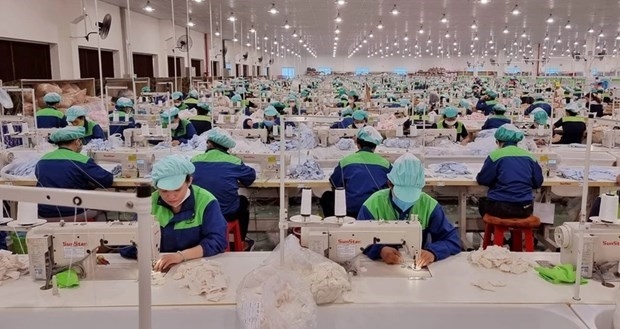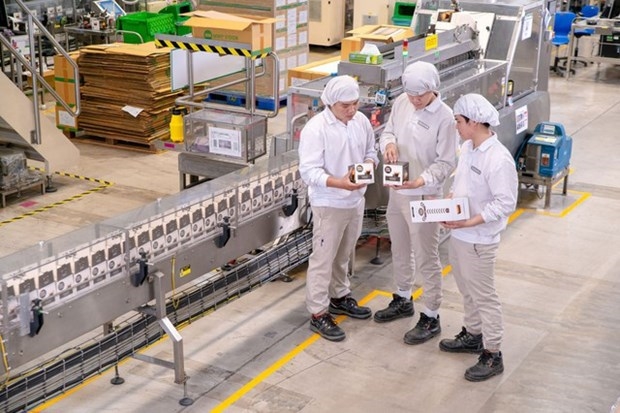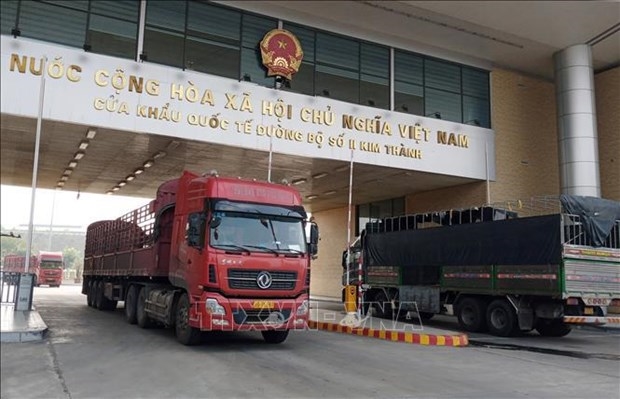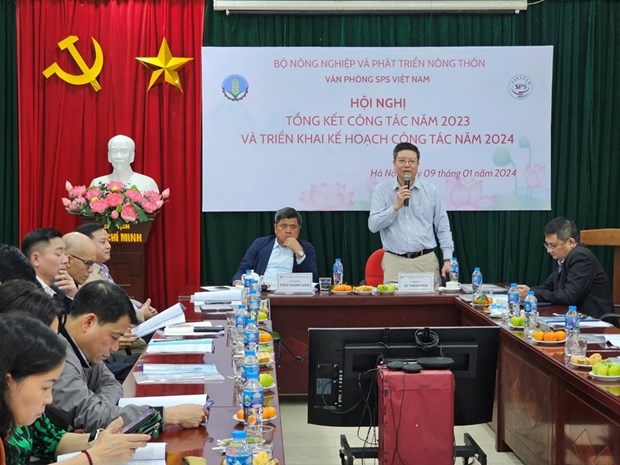 |
| A factory in the Du Long Industrial Park in Thuan Bac district, Ninh Thuan province. - Illustrative image (Photo: VNA) |
Bloomberg’s latest survey shows that the refinancing interest rate, currently at 4.5%, is seen to stay on hold through 2025, in the backdrop of a rebound in gross domestic product growth backed by strong exports. The rate was cut thrice between April and June last year to 4.5% from a peak of 6%.
In a previous survey, economists had expected a further 50 basis points of cuts during the current January-March period.
 |
| A view of HCM City from above - Illustrative image (Photo: VNA) |
Analysts also raised their headline inflation forecasts for 2024, now expecting price gains at 3.6% this quarter and at 4.05% in the next, up 0.7% and 0.75 % compared to the same periods last year, respectively.
They expect the annual inflation to average a faster 3.5% this year from 3% earlier, before easing to 3.2% in 2025. The 2024 level is still below the government’s targeted range of 4%-4.5%.
According to Bloomberg, the SBV is likely to keep the policy interest rate unchanged in the coming time, and this means that the heavy lifting — of returning economic growth to above 6% by attracting investors and encouraging spending - will be left to the government.
The Vietnamese economy is likely to grow 6.3% in the first quarter, and 6.5% in the April-June period. Vietnam’s GDP growth is forecast at 6% for this year, and 6.4% next year, said Bloomberg’s survey.
Han Teng Chua, an economist at DBS Bank Ltd, said Vietnam’s economy is recovering, adding that foreign direct investment is likely to remain forthcoming, with Vietnam staying attractive over the coming years, as companies diversify and derisk their supply chains by expanding into the Southeast Asian country.
Competitive wage costs, a wide network of trade agreements and supportive business environment are key advantages for the Vietnamese economy, he stated.
Nestlé adds more investment to expand production in Vietnam
 |
| A coffee production line at Nestlé Tri An factory, Dong Nai province - (Photo: baochinhphu.vn) |
Nestlé Vietnam has decided to invest an additional 100 million USD in its Tri An factory in southern Dong Nai province, lifting total investment capital in the establishment to more than 500 million USD, reported Vietnam News Agency.
According to Nestlé Vietnam General Director Binu Jacob, the investment aims to double the processing capacity of high-quality coffee products at the factory, towards meeting the increasing demand for coffee, and turning Vietnam into a high-value coffee production and supply centre for the global market.
Coffee products produced at the Tri An factory have been exported to 29 countries around the world. In addition, Nestlé is also the largest buyer of Vietnamese coffee with total annual purchase from Vietnam hitting up to 700 million USD.
Jacob said this additional investment is a testament to Nestlé's long-term investment commitment in Vietnam, adding that the factory's productivity is expected to double, meeting the domestic market's demand and effectively exploiting the export potential.
Sustainable coffee production is one of Nestlé's important directions in Vietnam. Apart from investing in production technology, the group's Tri An factory is a pioneer in sustainable development through using clean energy, biomass energy, and applying circular economy in waste management and water resources conservation.
Each year, the Nestlé Tri An factory can reduce more than 14,000 tonnes of CO2 emissions during its coffee processing. In addition, 100% of post-production coffee grounds are reused as biomass materials. Wastewater is also treated, recycled, and reused in the boiler, helping the factory save over 112,000 cu.m of water per year.
To improve the quality of Vietnamese coffee beans, since 2011, the company has implemented the NESCAFÉ Plan in the Central Highlands region, which provides good solutions to sustainably develop the Vietnamese coffee industry.
So far, the Nestlé Group has invested nearly 830 million USD in Vietnam through Nestlé Vietnam Co., Ltd with four factories and two distribution centres. In Dong Nai alone, the firm operates three factories, among them Nestlé Tri An is one of the group’s biggest factories in Vietnam.
Nearly 3,000 Vietnamese firms receive codes to export agricultural products to China
Nearly 3,000 Vietnamese firms have received codes granted by China, enabling them to export farm produce and food products to the Chinese market, reported Vietnam News Agency.
 |
| The Kim Thanh International Border Gate No. 2 in Lao Cai province. (Photo: VNA) |
According to the Vietnam Sanitary and Phytosanitary Notification Authority and Enquiry Point (SPS Vietnam) under the Ministry of Agriculture and Rural Development (MARD), in the last two years, Vietnamese firms have received 3,013 codes in line with the regulations on farming region supervision and origin tracking of farm produce under Orders 248 and 249 of China.
 |
| SPS Vietnam holds a meeting to review its performance in 2023 and launch its plan for 2024 on January 9. (Photo: VNA) |
Speaking at a meeting to review the performance of SPS Vietnam in 2023 and launch its plan for 2024, Deputy Director of the office Ngo Xuan Nam said Vietnamese firms are now paying more attention to registering to export to the Chinese market.
Le Thanh Hoa, Director of the SPS Vietnam, said that in 2024, relevant authorities will continue to update draft notices on food safety measures and animal and plant disease safety. and warnings from trade partners and the World Trade Organisation (WTO) members and inform relevant units.
The office will also coordinate with units to respond to comments on Vietnam's draft notices of SPS measures notified to the WTO.
It will coordinate with units of the Ministry of Industry and Trade and the Ministry of Agriculture and Rural Development in continuing to negotiate the SPS chapter of the EU-Vietnam Free Trade Agreement (FTA), and the Vietnam - United Arab Emirates FTA, and to upgrade the ASEAN - China FTA, the ASEAN - Canada FTA, and the ASEAN Trade in Goods Agreement.
In 2023, the office received and handled 1,164 notices on SPS-related regulation drafts and changes proposed by WTO members.
It said the higher number of notices shows that the world market is paying more attention to quality, hygiene, and food safety, and demanding more on these issues as well as factors related to green growth./.